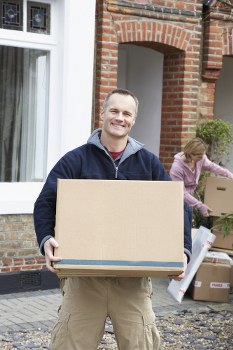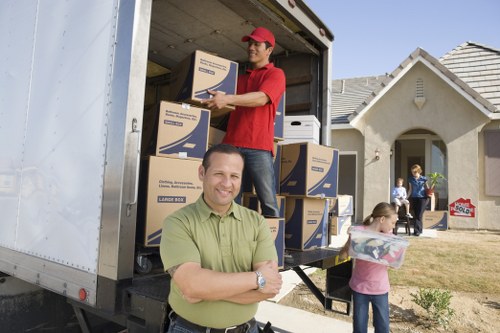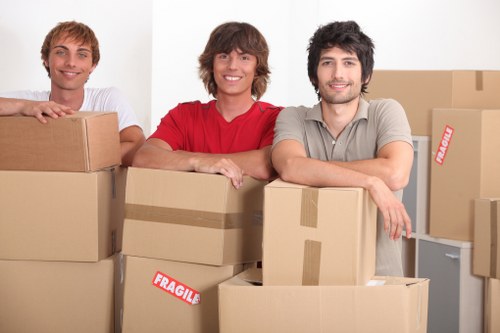Comprehensive Guide to White Goods Recycling in Reading

Recycling white goods is an essential practice for maintaining environmental sustainability and reducing waste in our communities. In Reading, residents have access to a variety of recycling options tailored to different types of household appliances. Understanding the process, benefits, and available services can help you make informed decisions when it's time to dispose of your old appliances.
White goods, such as refrigerators, washing machines, dishwashers, and ovens, are significant contributors to household waste. Proper recycling not only minimizes the environmental impact but also promotes the reuse of valuable materials. This guide aims to provide comprehensive information on white goods recycling in Reading, ensuring you have the knowledge needed to participate actively in local recycling efforts.
Whether you're upgrading your appliances or disposing of a non-functional unit, knowing the best practices and available resources is crucial. This article delves into the importance of recycling white goods, the process involved, and the specific services available to residents of Reading and its surrounding areas.
Why Recycle White Goods?

Recycling white goods offers numerous environmental and economic benefits. These large appliances often contain materials that can be repurposed, such as metals, plastics, and refrigerants, which can significantly reduce the need for new raw materials.
Moreover, proper disposal prevents harmful substances from contaminating the environment. For instance, refrigerants used in refrigerators and freezers can have detrimental effects on the ozone layer if not handled correctly. Recycling ensures these components are treated safely and responsibly.
Economically, recycling creates job opportunities and supports local industries involved in processing and refurbishing used appliances. By choosing to recycle, consumers contribute to a circular economy where products are reused and recycled, fostering sustainability and resource efficiency.
Environmental Impact
The environmental impact of white goods recycling cannot be overstated. Manufacturing new appliances consumes vast amounts of energy and resources. By recycling existing products, we reduce the demand for new materials, leading to lower greenhouse gas emissions and conserving natural resources.
Economic Benefits
Recycling white goods also has significant economic advantages. It reduces the costs associated with waste management and landfill usage. Furthermore, the materials recovered through recycling can be sold, generating revenue for recycling centers and supporting local economies.
How to Recycle White Goods in Reading

Recycling white goods in Reading involves several steps, from preparing your appliance for recycling to choosing the right recycling service. Here's a detailed breakdown of the process to ensure a smooth and efficient recycling experience.
1. Assess the Condition of Your Appliance: Determine whether your appliance is still functional or if it needs to be disposed of. Functional appliances can often be donated or resold, while non-functional ones should be recycled.
2. Choose a Recycling Service: There are multiple options available for recycling white goods in Reading. You can opt for local recycling centers, council collection services, or professional recycling companies. Each option has its own set of procedures and requirements.
Local Recycling Centers
Reading boasts several recycling centers equipped to handle white goods. These centers are designed to process large appliances efficiently, ensuring that materials are separated and recycled appropriately.
Council Collection Services
The local council offers collection services for bulky waste, including white goods. Scheduling a pickup is straightforward, and the council ensures that your appliance is recycled in line with environmental regulations.
Professional Recycling Companies
Numerous private companies specialize in white goods recycling. These companies often provide additional services, such as free pickup and data destruction for appliances like washing machines with built-in smart features.
Preparing Your Appliance for Recycling

Proper preparation of your white goods is essential to facilitate effective recycling. Follow these steps to ensure your appliance is ready for the recycling process:
- Disconnect and Clean: Ensure the appliance is unplugged and clean. Remove any food residues from refrigerators or dishwashers to prevent contamination.
- Remove Accessories: Take out detachable parts like shelves, grills, and drawers. These components should be recycled separately if possible.
- Defrost Refrigerators: If recycling a refrigerator or freezer, defrost it completely to eliminate ice buildup, which can interfere with transportation and processing.
Following these steps not only streamlines the recycling process but also adheres to safety guidelines, ensuring that the appliance is handled correctly.
Data Security
For appliances equipped with smart technologies, such as smart refrigerators or washing machines, it's vital to ensure data security. Delete any stored data and, if possible, reset the appliance to its factory settings to protect your personal information.
Benefits of Using Local Recycling Services

Opting for local recycling services in Reading offers several advantages over generic waste disposal methods. Not only does it support the local economy, but it also ensures that your appliances are recycled responsibly and in compliance with local regulations.
Local services are typically more efficient, with quicker turnaround times and personalized customer support. They are also more likely to follow stringent recycling protocols, ensuring that harmful substances are properly managed and materials are effectively repurposed.
- Convenience: Local recycling centers are easily accessible, reducing the hassle associated with transporting large appliances over long distances.
- Community Support: By choosing local services, you contribute to the sustainability initiatives within your community, fostering a culture of recycling and environmental responsibility.
- Compliance: Local recyclers are well-versed in the area's environmental regulations, ensuring that your appliance is recycled legally and ethically.
Recycling Incentives
Many local recycling services offer incentives to encourage residents to recycle their white goods. These incentives may include discounts on new appliances, vouchers, or even cash rebates. Taking advantage of these offers can make recycling more affordable and appealing.
Local Recycling Regulations in Reading
Understanding the local recycling regulations in Reading is crucial to ensure that you comply with all legal requirements. The local council has established guidelines to streamline the recycling process and minimize environmental impact.
- Registration: Some recycling centers require residents to register before dropping off large appliances. Check with your chosen facility for specific requirements.
- Fees: While some services are free, others may charge a nominal fee for recycling white goods. These fees typically cover transportation and processing costs.
- Prohibited Items: Certain components, such as refrigerants and mercury, are regulated and must be handled by certified recycling professionals. Ensure that your appliance does not contain these substances or that they are managed appropriately.
Adhering to these regulations ensures that your recycling efforts are effective and contribute positively to the community's sustainability goals.
Penalties for Non-Compliance
Failing to comply with local recycling regulations can result in penalties, including fines and legal action. It's essential to follow the prescribed guidelines to avoid such consequences and support environmental conservation initiatives.
Top Nearby Areas for White Goods Recycling
Reading is surrounded by numerous areas that offer excellent white goods recycling services. Here's a look at the top nearby regions where residents can efficiently recycle their household appliances:
- Maidenhead: Located just west of Reading, Maidenhead provides several recycling centers equipped to handle large appliances, ensuring materials are properly sorted and reused.
- Wokingham: East of Reading, Wokingham offers convenient council collection services for white goods, making it easy for residents to dispose of unwanted appliances.
- Bracknell: South of Reading, Bracknell has multiple private recycling companies that offer comprehensive white goods recycling solutions, including pickup and processing.
- Newbury: North of Reading, Newbury's recycling facilities are well-maintained, providing efficient services for various household appliances.
- Thatcham: Situated northeast of Reading, Thatcham boasts eco-friendly recycling centers focused on sustainable practices and material recovery.
- Wantage: West of Reading, Wantage offers accessible recycling options with a focus on minimizing environmental impact.
- Sonning: A picturesque area northwest of Reading, Sonning provides specialized recycling services for luxury and high-end white goods.
- Earley: Close to Reading, Earley has upgraded its recycling infrastructure to accommodate the growing demand for white goods recycling.
- Tilehurst: A suburban area within Reading, Tilehurst offers local drop-off points for recycling various household appliances.
- Emmer Green: Northeast of Reading, Emmer Green's recycling centers are known for their efficient processing and material recovery rates.
Specialized Recycling Services
Some nearby areas offer specialized recycling services tailored to specific types of white goods. For example, items containing refrigerants require specialized handling to prevent environmental harm. These specialized services ensure that all components are treated according to environmental standards.
Choosing the Right Recycling Option
With multiple recycling options available, selecting the right one depends on several factors, including convenience, cost, and the specific type of appliance you wish to recycle. Here's how to make an informed choice:
- Assess Your Needs: Determine whether you need pickup services or are willing to transport the appliance to a recycling center yourself.
- Compare Costs: Evaluate the fees associated with different recycling options. Some services may offer free recycling, while others charge based on the appliance type and size.
- Check Credentials: Ensure that the recycling service you choose is certified and adheres to environmental regulations. This guarantees that your appliance is recycled responsibly.
By considering these factors, you can choose a recycling option that best fits your requirements and supports sustainable practices.
Recycling Timelines
The time it takes to recycle a white good can vary depending on the service chosen and the type of appliance. Local council services may have scheduled pickups, while private companies might offer expedited services for an additional fee. Planning ahead ensures that your recycling process is smooth and timely.
Benefits to the Community
Recycling white goods contributes to the overall well-being of Reading's community. It reduces landfill waste, conserves natural resources, and fosters a culture of sustainability. Additionally, recycling initiatives often involve community engagement and education, promoting environmental awareness among residents.
Challenges in White Goods Recycling

Despite the numerous benefits, white goods recycling faces several challenges. These include the complexity of disassembling large appliances, managing hazardous materials, and ensuring efficient material recovery. Addressing these challenges requires continuous improvement in recycling technologies and processes.
- Technical Difficulties: Large appliances often consist of multiple materials bonded together, making them difficult to separate and recycle effectively.
- Hazardous Materials: Components like refrigerants and batteries pose environmental risks if not handled properly, necessitating specialized recycling practices.
- Economic Factors: The cost of recycling can sometimes be higher than the value of the recovered materials, impacting the financial viability of recycling programs.
Overcoming these challenges is essential for enhancing the efficiency and effectiveness of white goods recycling efforts in Reading.
Future of White Goods Recycling
The future of white goods recycling in Reading looks promising with advancements in recycling technology and increased community participation. Innovations such as automated disassembly and improved material separation techniques are expected to enhance recycling efficiency. Additionally, educational campaigns and incentives will likely boost participation rates, making recycling more accessible and widespread.
Conclusion
White goods recycling in Reading plays a pivotal role in promoting environmental sustainability and reducing waste. By understanding the available recycling options, preparing appliances correctly, and choosing the right services, residents can contribute significantly to local recycling efforts. Despite the challenges, ongoing advancements and community support are paving the way for a more sustainable future. Embracing recycling practices not only benefits the environment but also supports the economic and social well-being of the Reading community.
Frequently Asked Questions
- What are white goods?
White goods refer to large household appliances such as refrigerators, washing machines, dishwashers, and ovens.
- How can I recycle my old refrigerator in Reading?
You can recycle your old refrigerator by contacting local recycling centers, scheduling a council collection, or hiring a professional recycling company. Ensure it's properly prepared by defrosting and cleaning it before recycling.
- Is there a cost associated with recycling white goods?
Some recycling services are free, especially those offered by the local council, while others may charge a nominal fee depending on the appliance and service provider.
- Can I donate my functioning white goods instead of recycling them?
Yes, donating functional appliances to local charities or resale shops is a great way to extend their lifespan and reduce waste.
- What should I do with the refrigerant in my old fridge?
Refrigerants are hazardous and must be handled by certified recycling professionals. Ensure your recycling service is qualified to manage and dispose of refrigerants properly.